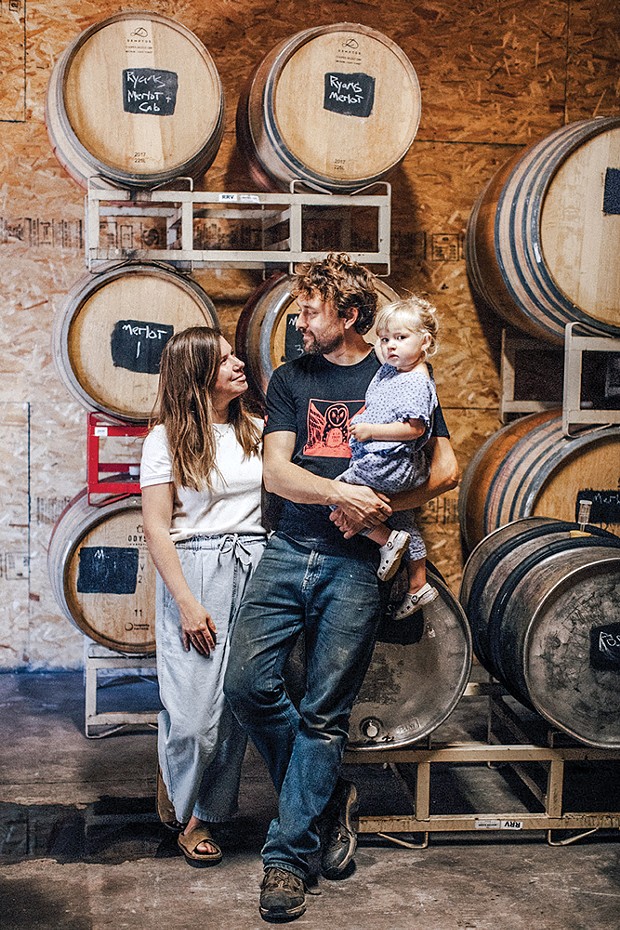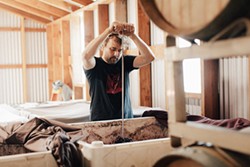
Courtesy of Miles Garrett Wines
Carla Barroso, Miles Garrett and 3-year-old Gala with barrels of natural wine.
[
{
"name": "Top Stories Video Pair",
"insertPoint": "7",
"component": "17087298",
"parentWrapperClass": "fdn-ads-inline-content-block",
"requiredCountToDisplay": "1"
}
]
How in the world can something so divine, ancient, romantic, soul-soothing and downright delicious not be good for you? Wine hangovers and headaches, seem a cruel joke in the universe's long, convoluted comedy set. But lately many wine lovers are considering "natural" wine the answer to their prayers, and it's hit the market in recent years with the popularity and fervor of crop tops and Crocs.
We have some top-tier producers here in Humboldt County. Trinity River Vineyards has created a delicious Wild and Spontaneous line in a collaboration with Libations owner NaRayan Urciuoli, who also curates incredible natural wines at the shop. Briceland Vineyards also has some fantastic, fun, bubbly Pet Nat options, among others. But Miles Garrett, who runs the eponymous winery, is one of the small minority of local winemakers brave enough to only make this style, accepting the risk for the reward of creating wines he believes in.
Generally speaking, natural wine is made with as few chemical or external additives as possible. There is no certification for an official natural wine, rather it is a descriptor or marketing tool that the winemaker can use to describe the style. Still, natural wines are usually made from grapes that are certified as organic or biodynamic, meaning the grapes were cultivated without pesticides and herbicides. Natural wines are also fermented with natural yeast, which creates different flavors depending on its origin. Instead of purchasing commercial yeast that's tried and true to ensure the fermentation reaches completion, natural wine makers prefer to take the risk and use yeast from their own land, so the finished product is a snapshot of the vineyard.
Perhaps the most touted and contentious aspect of natural wine is that it's made with little to no sulfites. Sulfites are naturally found in foods (mostly fermented) as well as the human body, and are also added to wine and other foods and beverages to preserve them. Sulfites are incredibly helpful to winemaking as they help preserve the freshness and extend the life of the wine. But sulfites have recently been accused of causing headaches and brain fog, and so consumers have been edging more and more toward wines labeled "sulfite free" or "made without sulfites." But there is debate among medical and wine communities alike about whether sulfites cause these negative effects.
Though some people are truly sensitive to sulfites, the Food and Drug Administration puts the percentage at around one percent. And there has been compelling research to prove that many negative effects are related to histamines derived from grapes (largely from the skins, leading to a stronger reaction to red wine) and are an inflammatory, allergy-like response from the body. Or maybe it's just a hangover. Look, I'm not a doctor and please do whatever makes you feel best, but I wouldn't count a wine out just because it doesn't say "sulfite-free."
The result is a unique, rustic and sometimes funky flavor that captures the terroir or sense of place. Wines have been made in this way for centuries, long before this trend, and many small, boutique wineries have always produced their wine with all or some of these key traits. So, if the funky, hipster style of natural wine isn't your jam but you would still like to stick to wine with fewer additives, wines from most small producers are a good bet.
Garrett recalls finding his love for winemaking by harvesting wild grapes and making wine "out of curiosity" 15 years ago, saying he has always had an intrinsic love for growing and farming. So, when his neighbors, then owners of the Winnett Vineyard in Willow Creek, chose to retire and sell their vines and winemaking facility in 2016, Garrett leapt at the opportunity to expand his hobby.
His first professional vintage was in 2017 and he has remained dedicated to the goal of producing all natural wines since. The vineyard had first been certified as organic in 1999 and Garrett has maintained it as such, using dry farming, meaning it's not irrigated and no pesticides or herbicides are used on the vines beyond the necessary dusting of sulfur to prevent mold. No sugar or acid is added to the wines, and the fermentation is done using only natural yeast. And finally, you guessed it, Garrett doesn't use sulfites (aside from the minimum required for cleaning the winery, which is essentially untraceable in the wines themselves).
"I'm not against sulfites," Garrett says, "I just don't use them in my wine." He explains that he believes wine should tell the story of the place from which it comes, and that the use of sulfites, yeasts and other additives only masks that story. "Since we farm the fruit, I find it to be a more honest expression," he says. "Sulfites are really just safeguards [and] protect your investment," he says. Which leads the inquisitive to wonder about the success of his own investment. Luckily, Garrett says aside from smoke from the wildfires in recent years, he hasn't had any trouble with his grapes or his wines, and has worked to address classic concerns in other ways (e.g. controlling the success of the yeast in fermentation with temperature.)
You may be asking yourself what the Miles Garrett wine tastes like with all these careful practices. Let me be candid here: I do not normally enjoy natural wines but I love these. Remember when I said that they can be a bit funky? Garrett is determined to "keep the funk out" and make approachable, enjoyable wines by prioritizing the fruit flavors, and aging the wine in neutral French oak and stainless steel (which is not the cool thing to do in the natural wine world).
The unique brightness of each of his wines make them stand out in a tasting as well as on a shelf with the eye-catching hues and labels designed by Garrett's wife, Carla Barroso, the marketing and business powerhouse of the winery. Though you really can't go wrong with any of his wines, the two that stand out as my favorite are: the 2021 Riesling (on skins), which has complex but refreshing notes of nectarine, white peach, orange blossom and Earl Grey tea, with an intriguing balance of bright acid and slight tannin; and the 2020 Carménère and Cabernet Franc blend which is a fresh compilation of marionberry, green bell pepper, boysenberry, butterscotch and lime zest, with mouth-watering acid and a bite of tannin. I recommend slightly chilling the latter.
So if you're looking for a wine to accompany the natural beauty of the landscape we call home, taking it along to share with out-of-town friends, or joining me on the couch to watch TV, the Miles Garrett Wines will offer a perfect "snapshot" of Humboldt County.
Erin Young (she/her) is a wine educator, consultant and Wine & Spirit Education Trust student. You can find out about her classes at the Wine Cellar via her Instagram @winewithyoung.
more from the author
-
Ale in the Castle
Arcata's brew scene has a new addition
- Jul 21, 2022
-
Jewell Distillery's Gin Journey
And its newest American Dry Gin
- Mar 31, 2022
-
A Safe Harbour for Coffee Lovers
- Feb 10, 2022
- More »

































